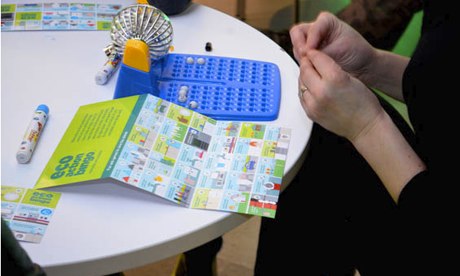
I'm going to confess something: whenever I put water in the kettle to make myself a brew, I fill it up. Right to the brim. It makes each subsequent beverage quicker to make, negates any risk of a sleepy miscalculation leaving me with a half-filled mug of astounding strength, and I, like most, am a selfish slave to convenience.
I imagine most would confess to similar acts of "lazi-nience". Maybe separating your household's rubbish into its recyclable constituents is the single least appealing prospect in the world after work and a soul-wringing commute, so the lot's deposited wholesale, under veil of darkness, gently and guiltily into the Wheelie Bin. Or perhaps the bathroom's so cold in the morning that walking in there is like being slapped across the entire torso by a frozen flatfish, so you stick the shower on for five minutes to let the steam warm it up.
Most people are aware of the dire need to reduce greenhouse gas emissions and that these actions don't exactly help. But beyond a vague notion of what I should be doing and the mild guilt that arises when I do the opposite, there's no law stipulating I can't have a full kettle. It's my house. And yet I still feel guilty. But not guilty enough to stop filling my kettle.
Climate change consultant Paula Owen agrees that guilt isn't sufficient negative reinforcement to incite change. "We [society] have tried to guilt-trip people," she says. "We berate them for enjoying themselves." Somewhat accurately calling this the "misery message", Owen suggests it hasn't worked as it asks people to be "cold, miserable and badly dressed".
Her latest study, entitled Can we play our way to a more sustainable future?, posits that fun is the key to training ourselves to be greener. A clutch of classic games were repurposed to promote sustainable behaviour and over the past year were presented to hundreds of people attending numerous events. Top Trumps, Snakes and Ladders, Bingo and Play Your Cards Right all received the treatment, with the benefits of small changes – turning a thermostat down a degree, switching the light off when leaving a room – conveyed though the mechanics of each game.
In questionnaires carried out months later, the average number of positive behaviours learned and actually upheld in daily life was a fairly impressive four. To put this in context, this equals a 500kg per year carbon reduction per participant. Rippled out into the millions, the effects could be sizeable. This isn't even mentioning the effects on those who may be encountering this information for the first time. Owen appears to be on to something – so much so that she intends to release an Eco Action Trump game app in time for Christmas.
The "gamification" of green education may grate with some as being insultingly patronising (with, and sorry, some rubbish games), but let's look at the alternatives. General finger-wagging is ineffectual, as it guilt, so they're out. Sustainability could be enforced punitively – the route-one approach when trying to enact mass changes in behaviour – perhaps meaning that households had a limit on the number of kilowatt hours to which they were entitled per year and were issued fines for exceeding this. Most would soon find ways of keeping within their allowance. This would of course come with the slight drawback of making life almost completely miserable, but it would probably work in principle. So let's call it plan B.
Another possible strategem is the creation of a green stigma: if any thoughtless profligate whose washing machine was set a single degree above 30 was judged to be an idiot and disgraced by society, then change may, slowly, find purchase. But this wouldn't work either, because it's stupid. And, finally, we have the remaining option of the apocalypse.
So I'll be giving Owen's app a go. Yes, it may suggest that we're only imprintable with positive behaviours if we're tricked and conditioned, like children, or dogs, but it does appear to be effective. And, hey, an afternoon playing Recyclo-Boggle or something might be a laugh. Maybe.
But if the only alternatives are heavy fines, societal ostracism, perennial feelings guilt or the end of the world, then I can take being treated like a feckless buffoon. It's cheaper, easier, and brilliantly kettle-guilt free.

